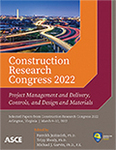Knowledge Exchanges in Complex Project Networks: Influence Model
Publication: Construction Research Congress 2022
ABSTRACT
Characterized by fragmented nature and different conditions for every project, the Architecture, Engineering, and Construction (AEC) industry seeks remedies to achieve enhanced project outcomes including sustainability. Highly integrated project teams can overcome the obstacles by exchanging knowledge, goal alignment, and risk and reward sharing. Understanding the interaction patterns in project team networks can help implement desired practices to optimize sustainability outcomes. According to the influence theory, individuals are influenced by their interactions. They change their beliefs and practices in response to the people they connect with. Basic influence processes yield complex interactions and behavior patterns, and insights to these processes can help understand knowledge transfers in project team networks. The goal of this study is to examine the formation of knowledge transfer networks for sustainability in project teams via the lens of influence model and provide insights to complex organizational behaviors. To achieve study goal, we longitudinally collected e-mail exchange and archival data from an AEC project and performed Social Network Analysis (SNA) focusing on Energy and Atmosphere related interactions. The results showed that the exposure to the nodes with high-engagement levels and diverse expertise areas in a network positively impacts the sustainability knowledge transfers and engagement level of the individuals.
Get full access to this article
View all available purchase options and get full access to this chapter.
REFERENCES
Butts, C. (2008). “Social network analysis: A methodological introduction.” Asian Journal of Social Psychology, 11, 13–41.
Chinowsky, P., Diekmann, J., and Galotti, V. (2008). “Social network model of construction.” Journal of construction engineering and management, 134(10), 804–812.
Cialdini, R. B., and Goldstein, N. J. (2004). “Social influence: Compliance and conformity.” Annu. Rev. Psychol., 55, 591–621.
Das, K., Samanta, S., and Pal, M. (2018). “Study on centrality measures in social networks: a survey.” Social Network Analysis and Mining, 8(1), 13.
Duva, M., Mollaoglu, S., Zhao, D., and Frank, K. (2020). “Expertise flows in AEC projects: An analysis of multi-level teams for sustainability.” Proc., 18th Annual Engineering Project Organization Conference (EPOC).
Frank, K., Lo, Y.-J., Torphy, K., and Kim, J. (2018). “Social networks and educational opportunity.” Handbook of the Sociology of Education in the 21st Century, B. Schneider, ed., Springer International Publishing, Cham, 297–316.
Frank, K. A., and Fahrbach, K. (1999). “Organization culture as a complex system: Balance and information in Models of Influence and Selection.” Organization Science, 10(3), 253–277.
Frank, K. A., Zhao, Y., and Borman, K. (2004). “Social capital and the diffusion of innovations within organizations: The case of computer technology in schools.” Sociology of Education, 77(2), 148–171.
Freeman, L. C. (1978). “Centrality in social networks conceptual clarification.” Social Networks, 1(3), 215–239.
Freeman, L. C. (1984). “Turning a profit from mathematics: The case of social networks.” The Journal of Mathematical Sociology, 10(3-4), 343–360.
Friedkin, N. E., and Johnsen, E. C. (1990). “Social influence and opinions.” The Journal of Mathematical Sociology, 15(3-4), 193–206.
Garcia, A. J., Duva, M., Mollaoglu, S., Zhao, D., Frank, K., and Benitez, J. (2020). “Expertise flows and network structures in AEC project teams.” Proc., Construction Research Congress (CRC), ASCE, Tempe, AZ.
Granovetter, M. S. (1973). “The strength of weak ties.” American Journal of Sociology, 78(6), 1360–1380.
Hanneman, R. A., and Riddle, M. (2005). Introduction to social network methods, (Electronic book), University of California, Riverside, CA.
Henry, A. D., and Vollan, B. (2014). “Networks and the challenge of sustainable development.” Annual Review of Environment and Resources, 39(1), 583–610.
Kadushin, C. (2012). Understanding social networks: Theories, concepts, and findings, Oup Usa.
Kaufer, D. S., and Carley, K. M. (2012). Communication at a distance: The influence of print on sociocultural organization and change, Routledge.
Kelman, H. C. (1953). “Attitude change as a function of response restriction.” Human Relations, 6(3), 185–214.
LEED. (2016). LEED v4 Checklist for Building Design and Construction. United State Green Building Council.
Marsden, P. V., and Friedkin, N. E. (1993). “Network studies of social influence.” Sociological Methods & Research, 22(1), 127–151.
Mollaoglu-Korkmaz, S., Swarup, L., and Riley, D. (2013). “Delivering sustainable, high-performance buildings: Influence of project delivery methods on integration and project outcomes.” Journal of Management in Engineering, 29(1), 71–78.
Moreno, J. L. (1960). The sociometry reader, Free Press, New York, NY, US.
Penuel, W., Frank, K., Sun, M., Kim, C., and Singleton, C. (2013). “The organization as a filter of institutional diffusion.” Teachers college record, 115(1), 1–33.
Quintane, E., and Kleinbaum, A. (2011). “Matter over mind? E-mail data and the measurement of social networks.” Connections, 31, 22–36.
Riley, D., Magent, C. S., and Horman, M. “Sustainable metrics : A design process model for high performance buildings.”
Rogers, E. M., Singhal, A., and Quinlan, M. M. (2014). Diffusion of innovations, Routledge.
Zhao, D., Duva, M., Mollaoglu, S., Frank, K., Garcia, A., and Tait, J. (2021). “Integrative collaboration in fragmented project organizations: Network perspective.” Journal of Construction Engineering and Management, 147(10), 04021115.
Information & Authors
Information
Published In
History
Published online: Mar 7, 2022
Authors
Metrics & Citations
Metrics
Citations
Download citation
If you have the appropriate software installed, you can download article citation data to the citation manager of your choice. Simply select your manager software from the list below and click Download.
